Eighty-nine percent of the world’s 1.6 billion Muslims are not affected by the revised Executive Order 13780 titled “Protecting the Nation From Foreign Terrorist Entry into the United States” signed by President Trump on Monday, March 6.
The revised order temporarily bans — for 90 days — the entry into the United States of citizens from six Middle Eastern countries who do not currently hold green cards.
In Monday’s executive order, President Trump revoked the executive order of the same name, Executive Order 13769 “Protecting the Nation From Foreign Terrorist Entry into the United States,” which he signed on January 27, 2017 “as of the effective date of this order,” which Section 14 of today’s order stated “is effective at 12:01 a.m., eastern daylight time on March 16, 2017,” ten days after Monday’s signing.
Approximately 10.5 percent of the world’s Muslims, or 167.7 million out of 1.6 billion, live in those six countries, according to a 2015 Pew Research Report, “The Future of World Religions: Population Growth Projections, 2010-2050.”
The Muslim population in each of these six countries, estimated by Pew Research as of 2010, is: Iran (74 million), Sudan (33.6 million), Yemen (24 million), Syria (20.4 million), Somalia (9.3 million), and Libya (6.4 million).
Iraq, which is home to 31.6 million Muslims (two percent of Muslims in the world) and was included as the seventh nation to which the temporary travel ban applied in the now-revoked Executive Order 13769 signed on January 27, is not included in the six country travel ban specified in the executive order signed by President Trump on Monday March 6, which has the same title as the revoked Executive Order.
The temporary travel ban in that now-revoked executive order, as Breitbart reported previously, did not apply to eighty-seven percent of the world’s 1.6 billion Muslims.
Secretary of State Rex Tillerson, Attorney General Jeff Sessions, and Secretary of Homeland Security John Kelly spoke at a press briefing on Monday outlining the details of the new executive order.
“Our founders wisely gave the executive branch the authority and the duty to protect the nation. This executive order is a proper exercise of that power,” Attorney General Sessions said at that press conference, which can be seen in its entirety as broadcast on C-SPAN here.
One mainstream media outlet inaccurately described Monday’s executive order.
USA Today’s lead on page one shortly after President Trump signed the executive order on Monday blared “Trump issues revised travel ban for majority Muslim countries.”
The headline of the actual story was more precise, stating “Trump issues revised travel ban for six majority-Muslim countries.”
The Anti-Defamation League (ADL) also took exception to the revised executive order.
“While some of the initial executive order has been revised, the message is the same: that Muslims and refugees who are fleeing for their lives are not welcome on our shores,” Jonathan A. Greenblatt, CEO of ADL, said in a statement released on Monday.
“To be sure, rigorous screening for everyone seeking to enter the U.S. is vital, but this order appears to be designed to exclude one religious group and is nothing less than a page taken from the anti-immigrant movement’s playbook. This is an appeal to xenophobia and fear,” Greenblatt added.
The revised executive order also temporarily halts the Refugee Admission Program for 120 days. This means that no refugee not already in the pipeline from any country will be allowed to enter the United States during this period, though the Department of State and the Department of Homeland Security are granted the discretion to make case by case exceptions.
The revised executive order also reiterates the 50,000 limitation on refugees for FY 2017 first ordered in the now revoked Executive Order 13769 signed on January 27.
Five months and five days into FY 2017, a total of 37,323 refugees have been resettled in the United States, according to the State Department’s interactive website.
In FY 2016, President Obama’s last full year in office, 84,995 refugees were resettled here.
In contrast to the now-revoked Executive Order 13769, green card holders from the six countries subject to the travel ban–legal permanent residents of the United States–are not included in those prohibited from entering the United States during this 90 temporary ban period.
The now revoked Executive Order 13769 specifically banned residents of Syria from entering the United States until improvements in the immigration vetting process there were successfully undertaken.
The revised executive order subjects non-green card holding Syrians, as residents of one of the six identified Middle Eastern countries, to the 90 day temporary ban, but subsequent to the end of that period Syrians receive the same treatment as residents of the five other countries subject to the temporary ban.

COMMENTS
Please let us know if you're having issues with commenting.